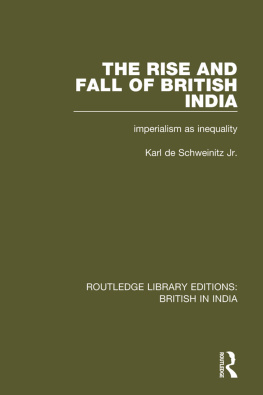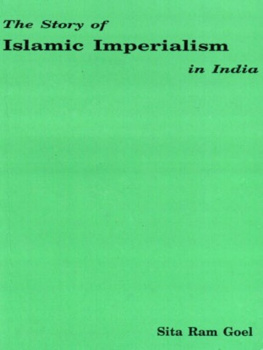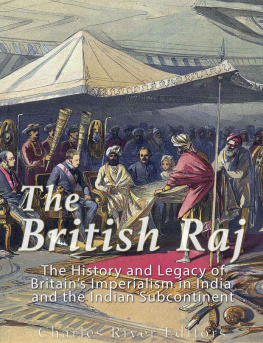ROUTLEDGE LIBRARY EDITIONS: BRITISH IN INDIA
Volume 20
THE RISE AND FALL OF BRITISH INDIA
The Rise and Fall of British India
imperialism as inequality
Karl de Schweinitz Jr.
First published in 1983 by Methuen & Co. Ltd
This edition first published in 2017
by Routledge
2 Park Square, Milton Park, Abingdon, Oxon OX14 4RN
and by Routledge
711 Third Avenue, New York, NY 10017
Routledge is an imprint of the Taylor & Francis Group, an informa business
1983 Karl de Schweinitz, Jr
All rights reserved. No part of this book may be reprinted or reproduced or utilised in any form or by any electronic, mechanical, or other means, now known or hereafter invented, including photocopying and recording, or in any information storage or retrieval system, without permission in writing from the publishers.
Trademark notice : Product or corporate names may be trademarks or registered trademarks, and are used only for identification and explanation without intent to infringe.
British Library Cataloguing in Publication Data
A catalogue record for this book is available from the British Library
ISBN: 978-1-138-22929-7 (Set)
ISBN: 978-1-315-20179-5 (Set) (ebk)
ISBN: 978-0-415-39501-4 (Volume 20) (hbk)
ISBN: 978-0-415-39526-7 (Volume 20) (pbk)
Publisher's Note
The publisher has gone to great lengths to ensure the quality of this reprint but points out that some imperfections in the original copies may be apparent.
Disclaimer
The publisher has made every effort to trace copyright holders and would welcome correspondence from those they have been unable to trace.
The RISE and FALL of BRITISH INDIA
imperialism as inequality
Karl de Schweinitz Jr.
First published in 1983 by
Methuen & Co. Ltd
11 New Fetter Lane, London EC4P 4EE
Published in the USA by
Methurn & Co.
in association with Methuen, Inc.
733 Third Avenue, New York, NY 10017
1983 Karl de Schweinitz, Jr
Printed in the United States of America
All rights reserved. No part of this book may be reprinted or reproduced or
utilised in any form or by any electronic, mechanical or other means, now
known or hereafter invented, including photocopying and recording, or in any
information storage or retrieval system, without permission in writing from the publishers.
British Library Cataloguing in Publication Data
De Schweinitz, Karl
The rise and fall of British India
1. India-History-British occupation
I. Title
954.03 DS463
ISBN 0-416-33530-6
0-416-33540-3 (University paperback 804)
Library of Congress Cataloging in Publication Data
De Schweinitz, Karl, 1920-
The rise and fall of British India
Bibliography: p.
Includes index.
1. Imperialism-Case studies 2. India-History-
British occupation, 1765-1947. I. Title.
JC359.D36 1983 325'.341'0954 82-20868
ISBN 0-416-33530-6
o-416-33540-3 (University paperback 804)
In writing this book I am doubly presumptuous, first for addressing the matter of imperialism about which in the last century there has been a crescendo of commentary and learned exegeses and, second, for looking to India's history for the institutional substance of my argument when I have neither the formal credentials of an Indian scholar nor the insouciant assurance of James Mill that that is all to the good. My argument, however, addresses an aspect of imperialism that has been neglected, namely its coercive impact on the imperialized. This neglect, oddly enough, reflects the tendency of the theorists and historians of imperialism to assume that its grim underside is self-evident and what needs explanation is its causes.
I come to this matter from a long-standing interest in political economy. I believe Carlyle's characterization of it was well-founded in that resources are made scarce by the demands imposed upon them and that however societies resolve the consequent choice dilemmas they must in some degree constrain individuals. Outside the Garden of Eden coercion is at a discount. My assessment of it in imperialism therefore starts from the premise that we are concerned with a special manifestation of a general problem.
My choice of the British in India for the historical basis of my argument needs no defense. It is a long and varied history of the encounter of quite different peoples in vast and changing settings which has generated an inexhaustible literature the reading in which is its own reward. My obligation to the legion of Indian, African, and Asian scholars, both in the East and West, who have made that history so vivid is profound. Without them it would have been impossible to season the insights of economics with non-western experience. Of that splendid host I am especially indebted to three persons who read previous drafts of the entire manuscript. A. G. Hopkins of the University of Birmingham rendered me invaluable service by calling attention to problems I had overlooked and the references which helped me cope with them in revision. John R. McLane of Northwestern University gave me the careful reading of an Indian scholar of Bengal. He also was extremely generous in sharing with me the extensive resources of his personal library. Rhoads Murphey of the University of Michigan, whose knowledge of Asian, especially Chinese and Indian, institutions has been enriched by intermittent residence in various parts of Asia going back to the middle years of World War II, was at once supportive and insistent that the development of my thesis needed greater focus and coherence. Needless to say, none of these scholars is responsible for the way in which I have responded to their criticisms.
It would have been very much more difficult for me to do the reading and write the initial draft of the manuscript had I not had a leave of absence from Northwestern University during the academic year 1978-9. I am grateful to Dean Rudolph H. Weingartner of the College of Arts and Sciences and Dean David S. Ruder of the Law School for releasing me from my normal academic obligations and financing the 'leisure' for the enterprise. My thanks also to Ved Mehta for permission to quote an extensive passage from 'City of the Dreadful Night'; to the New Yorker Magazine where it first appeared; and to Farrar, Straus & Giroux who reprinted it in his Portrait of India in 1970. Finally, I thank V. S. Naipaul for permission to use a similarly long passage from 'India, New Claim in the Land' and the New York Review which published it in June 1976.
KARL DE SCHWEINITZ JR.
Evanston, Illinois
1982
1
Imperialism
On 13 April 1919 General Reginald Dyer ordered British troops in his command to fire upon a crowd of some 5000 Indians who had gathered peaceably in an open area in Amritsar called the Jaliianwala Bagh to listen to nationalists speak about independence, a goal whose time appeared to have come. The command was not preceded by a warning or an order to disperse. Nor did General Dyer call a cease-fire, when men, women, and children in their frenzy to escape the fusillade piled up at the bottlenecks of the narrow alleys which were the only means of getting into and out of the Jallianwala Bagh. The firing started at 5.00 p.m. and stopped at 5.15 p.m., by which time the Indian sepoys had exhausted their ammunition. The troops then withdrew, leaving behind, according to the official report, 3 79 dead and at least 1200 wounded, none of whom was given medical assistance. In testimony before the Hunter Committee that was subsequently appointed to investigate the matter, General Dyer acknowledged that had he been able to maneuver the machine guns of his detachment through the narrow alley leading to the Jaliianwala Bagh he would have deployed them too for maximum effect.












